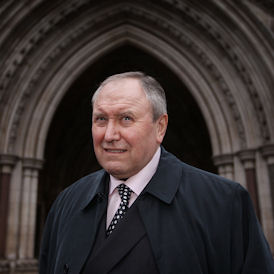George Davis robbery conviction overturned
A man who has spent decades denying his involvement in an armed robbery in the 1970s, and protesting his innocence, wins an appeal against his conviction.

George Davis has always denied his role in a raid in April 1974 at the London Electricity Board (LEB) in Ilford, Essex – for which he was briefly jailed.
Now three Court of Appeal judges have announced that his conviction was “unsafe”, although they said they were unable to “positively exonerate him”.
Mr Davis said he was delighted his conviction had been quashed, adding: “This is a bittersweet moment for me.”
Celebrity backing
Mr Davis, now 69, became a household name after his conviction in the seventies, with celebrity backers protesting his innocence. Graffiti also appeared daubed on walls across Britain supporting him.
Punk band Sham 69 wrote a song about him, The Who singer Roger Daltrey wore a T-shirt denying his guilt, and campaigners calling for his release vandalised the pitch at Headingley cricket ground in Leeds in 1975, causing a Test match between England and Australia to be called off.
Their efforts did see him freed – but he was then imprisoned for a different offence.
It should not have taken 36 long years for me to be able to stand here like this. George Davis
He was originally sentenced in March 1975 to 20 years for robbery and wounding with intent to resist arrest over the LEB raid. The same year the Court of Appeal rejected a conviction appeal bid, but reduced his sentence to 17 years. His sentence was then remitted by Royal Prerogative and he was released from prison in 1976.
He was arrested again in September 1977 and later pleaded guilty to his involvement in an armed robbery at the Bank of Cyprus in London. He was sentenced to 15 years, reduced to 11 years on appeal.
‘Safety’ of conviction
Mr Davis won his appeal on the basis of fresh material relating to identification, which affected the testimony of another witness.
Lord Justice Hughes said: “We do not know whether Davis was guilty or not, but his conviction cannot be said to be safe. As we have made clear, the fact that he was an active and known criminal does not affect this question, nor does it make it any the less important that his conviction should not be upheld unless it is clear that it is safe.”
Mr Davis said he had always claimed that he had been falsely identified.
He said: “It should not have taken 36 long years for me to be able to stand here like this…I have pursued this appeal for all these years because I wanted all those people who worked for, and helped, the campaign in the 1970s to know that their support was justified.”
-
Latest news
-
Laughing Boy: New play tells the tragic tale of Connor Sparrowhawk5m

-
Sewage warning system allows some of worst test results to be left off rating system, analysis shows3m

-
Post Office inquiry: Former CEO didn’t like word “bugs” to refer to faulty IT system4m

-
Israeli soldier speaks out on war in Gaza12m

-
PM’s defence spending boost should be ‘celebrated’, says former Armed Forces Minister4m

-




